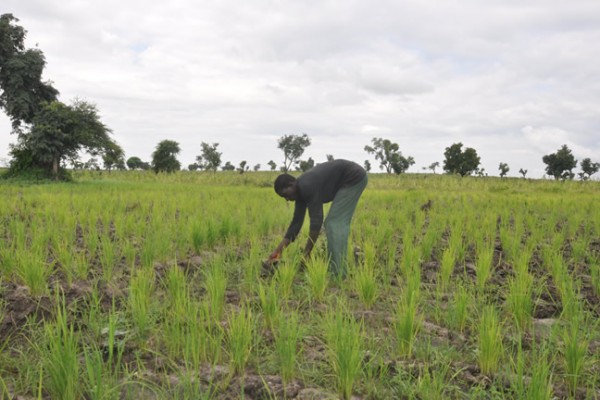Nigeria's CBN governor.
Godwin Emefiele, governor of the Central Bank of Nigeria (CBN), says the bank will have created about one million direct and indirect agriculture processing jobs via its Anchor Borrowers’ Programme (ABP) by 2021.
Speaking in Jibia, Katsina state, at the formal flag-off of the rice dry season farming, Emefiele said Nigeria’s food import bill was exceptionally high and that rice and wheat formed part of four items that consumed N1 trillion in foreign exchange.
Another reason he adduced was that food importation fueled domestic inflation, depleted our foreign reserves, displaced local production and created unemployment.
He noted that import dependency, especially on commodities of comparative advantage, was neither acceptable nor sustainable.
Advertisement
Emefiele, who was represented at the event by Mudashiru Olaitan, director, development finance department (DFD), said a report by the Global Economic Symposium (GES) suggested a steady rise in prices of rice in the past seven to eight years, which indicated that Nigeria had been consuming more rice than it had been producing.
He added that with the fast depletion of rice reserve in the country, it was obvious that Nigeria could not afford to sustain rice importation.
The first step in curtailing this, according to him, is the exclusion of rice from the forex eligibility list, followed by the establishment of the ABP initiative.
Advertisement
Emefiele also enumerated ABP’s challenges since its creation, which he said existed in spite of the huge investment in 40 integrated rice mills.
Some of the challenges include low-yield rice varieties, poor farming practices and lack of good quality farm inputs.
Other challenges he listed were non-utilisation of available cultivable lands, manual system of production, and inadequate funding for the establishment and development of nucleus farms and small farmers out-grower schemes.
The governor equally listed some targets that the ABP sets to achieve in the next five years.
Advertisement
These include increase in the ratio of agricultural lending from 3.72 per cent of total bank lending in 2014 to 7.0 per cent, increased capacity utilisation from the current level of less than 50 per cent to about 80 per cent, and empowering of at least 600,000 farmers in the rice, oil palm, wheat, cotton and fish value chains.
Other ABP targets achievable by 2021 would be the creation of at least 1,000,000 direct and indirect jobs in the processing segment of the identified value chains, reducing Nigeria’s import bill on the identified commodities by at least 10 per cent annually.
Add a comment







